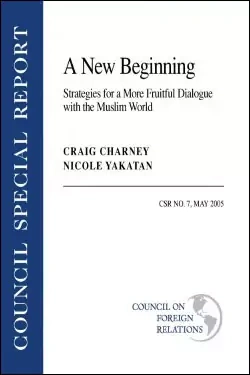
A New Beginning
Strategies for a More Fruitful Dialogue with the Muslim World

- Council Special Report
- Concise policy briefs that provide timely responses to developing crises or contributions to current policy dilemmas.
Overview
Focus group research in Morocco, Egypt, and Indonesia has shown that it is possible to improve the image of the United States in the Muslim world.
Although many Muslims are angry at what they perceive America does, the right efforts to communicate can produce significant shifts in attitudes. Such efforts would involve listening more, speaking in a humbler tone, and focusing on bilateral aid and partnership, while tolerating disagreement on controversial policy issues. Fortunately, a window of opportunity has opened with the Iraqi elections, renewed hope for Israeli-Palestinian peace, tsunami relief, and developments in Lebanon and Egypt, as well as the start of a new administration in Washington. This moment, marked by an easing of tensions and the arrival of new actors on both sides, offers the possibility of a new beginning in America's dialogue with the Muslim world.
More on:
Attitudes toward America in the Islamic countries in this study are marked by ambiguity and ambivalence -- but they have become much more negative in recent years. The first section of this report lays out the current mix of attitudes toward America in Egypt, Morocco, and Indonesia. Immediate reactions to the United States reveal resentment of American power and of President George W. Bush. American behavior is perceived as being largely predatory. This hostility is spilling over into negative attitudes toward American people and brands. Yet Muslims still respect, if somewhat grudgingly, America's economic strength, educational and legal systems, and work ethic. They recognize that America possesses what they believe their own societies need most to develop. They are of two minds about American popular culture, drawn to American styles and movies yet appalled by their violent and lewd aspects. Many Muslims are so alienated that they claim they would not like to visit the United States, nor would they mind if the United States withdrew -- politically, economically, and militarily -- from the Muslim world. There are some predictable demographic differences -- older people, women, and those further from the Israeli-Palestinian conflict are less hostile -- but the most striking finding in this study is how widely anger has spread across the different demographic groups and countries.
There are important openings for America to communicate more effectively and regain ground in the Islamic world, the focus groups show, despite the extent of hostility at the moment. These opportunities can be realized by focusing on bilateral relationships and respectful partnerships, Muslim initiative, and agreeing to disagree on contentious security issues involving other countries such as Iraq or Palestine. Informing people about aid in the areas in which America's strengths are acknowledged had a significant positive effect on the attitudes of focus group members. (The more favorable impressions among Moroccan women due to democracy assistance and in Indonesia after the outpouring of tsunami aid are pointers in this direction.) These gains could be enhanced by efforts to promote consultation and transparency in aid programs. There are also various possible aid projects, including support for English and science education, trade and investment missions, and media efforts, which could make a difference if undertaken as U.S. government, private corporate, or foundation initiatives.
Still, substantial efforts will be required to communicate more effectively. Turning information and initiatives into communications that are heard requires more actively engaging local media -- including the controversial al-Jazeera -- as well as paid advertising, effective spokespeople, and logos and labels on aid. Nongovernmental efforts to challenge the misconceptions common among focus group members about U.S. foreign policy, including those regarding Jewish influence, would also be helpful in breaking down barriers to communication in the Islamic world. Finally, effectively organizing governmental communications will require more research, coordination, country-level planning, piloting, and professionalism, sustained over several years.
More on:
 Online Store
Online Store